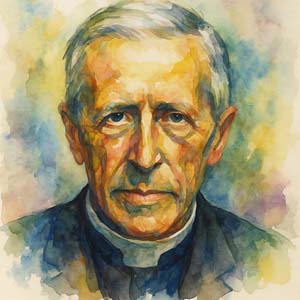— Pierre Teilhard de Chardin
 Jesuit scientist and visionary Pierre Teilhard de Chardin (1881–1955) was born on this day in Sarcenat, France. A teacher, mystic, and paleontologist, he entered the seminary at 18 and taught for nearly three decades—until the Vatican silenced him for daring to connect evolution with faith.
Jesuit scientist and visionary Pierre Teilhard de Chardin (1881–1955) was born on this day in Sarcenat, France. A teacher, mystic, and paleontologist, he entered the seminary at 18 and taught for nearly three decades—until the Vatican silenced him for daring to connect evolution with faith.
“Love is a sacred reserve of energy,” he believed, “like the blood of spiritual evolution.”
His writings offered a passionate plea to see the divine in the unfolding of the universe. In blending science with religion, Teilhard’s neo-humanist vision anticipated the Gaia hypothesis—Earth as a living super-organism greater than the sum of its parts.
“We are, at this very moment, passing through a change of age. Beneath a change of age lies a change of thought.”
Exiled by the Church, he worked as a paleontologist in China from 1926–1946 and helped discover Sinanthropus, the Peking Man. During this time, he drafted The Phenomenon of Man, a sweeping spiritual manifesto that described humanity’s evolution toward the “Omega Point”—a unity with God.
“The conclusion is always the same,” Teilhard wrote. “Love is the most powerful and still most unknown energy in the world.”
He saw love not merely as emotion, but as a sacred force—mysterious, magnetic, and essential to the evolution of our souls. To love is to participate in creation itself, to merge spirit and matter, to move the universe forward with grace. This, he believed, is why we are here.
 We are stars, connected and shining with love. ✨
We are stars, connected and shining with love. ✨
